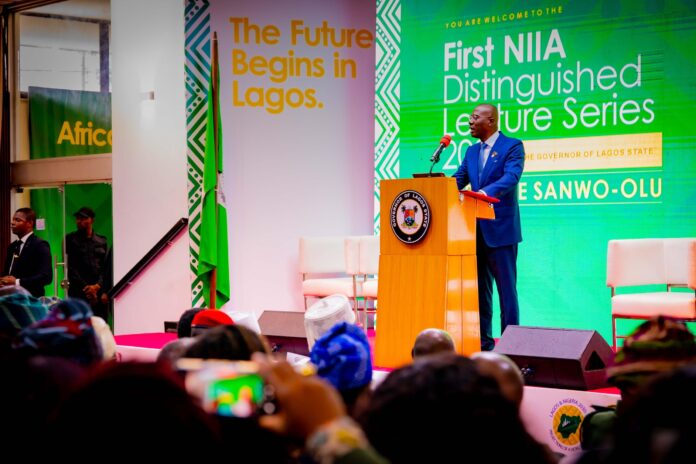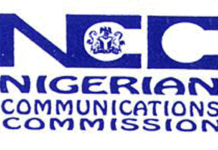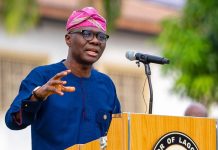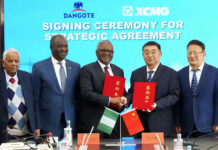YOUTH IS NIGERIA’S MOST VALUABLE ASSET TO ATTAIN GLOBAL ECONOMIC INFLUENCE — SANWO-OLU
…Governor delivers first NIIA’s Distinguished Lecture, endows Foreign Policy school at Institute
…‘Nigeria’s economic competitiveness lies in Lagos’
Lagos State Governor Babajide Sanwo-Olu delivered the inaugural Distinguished Lecture Series of the Nigerian Institute of International Affairs (NIIA) in Victoria Island, examining how the nation could attain global influence by harnessing its most endowed asset — the youth.
The nation’s young population, Sanwo-Olu echoed at the lecture with the theme: “Lagos and Nigeria 2030: Projections of a World Power”, remained one of the largest, with an estimate of 100 million people under the age of 20.
This, the Governor said, was an extraordinary asset that could catapult Nigeria to the global stage of economic influence, but only if the asset would be properly harnessed.
The audience, comprising academics, policy researchers, professionals in public sector, captains of industry, veteran journalists and traditional rulers, was held spell-bound in the Institute’s main auditorium as the Governor delved into the lecture.
Sanwo-Olu dissected the nation’s growth journey from the era of oil-controlled global economic leadership of the 20th century through the contemporary period driven largely by technological revolution, cyber warfare and transition fuel.
The Governor opined that the term “world power” was not a static concept, but a constantly evolving notion in the realm of global politics. In contemporary times, he said global power is a multidimensional idea, combining a range of influence in economic power, geopolitical clout, technological capacity, cultural and soft power, military and defence strength, demography and resource abundance.
The Lagos helmsman said the end of 20th century saw Nigeria usher in democracy to close a dark era in which the nation grappled with political turmoil and international disconnection. He said the nation entered into the 21st century with tensions of democracy, constitutionalism and federalism, while setting forward development visions that would propel its growth away from the misadventure of the military era.
Sanwo-Olu said the unbroken period of civilian government had entrenched the nation’s freedom to excel in different areas of creative abilities, while attracting global attention in contemporary fields ranging from academic, literature to film, sports, music and fashion. As democracy evolved, he said Nigeria must now focus on unlocking its potential to conquer new ground in areas driving modern economic system.
He said: “We must now focus wholly on maximising our talents and potential to unlock our power to the fullest, especially in those fields and arenas in which we are still lagging behind. We must do this while also consolidating and conquering new ground in the spheres in which we have already demonstrated strength. Our most important assets, above our oil and gas and above our marine and forest wealth, are the people.
“Today, Nigeria has one of the largest populations of young people in the world, estimated to be 100 million people under the age of 20. This makes it impossible to envision the workforce of the 21st century without fully accounting for Nigeria. This is an extraordinary asset, but only if properly harnessed. In the area of cutting-edge technologies, such as cloud computing and artificial intelligence, we must make ourselves felt not just as consumers but also as producers.”
Sanwo-Olu said the nation’s ambitious vision to attain a $1 trillion economy by 2030 was attainable and could potentially turn Nigeria a global powerhouse, given the pace of economic reforms being implemented by the President Bola Ahmed Tinubu administration.
The Governor said the President’s reforms rested on the pivot of both oil and non-oil economic growth. He noted that the removal of petrol subsidies, unification of multiple foreign exchange rates, unprecedented fiscal and tax reforms were part of the bold steps taken in the last two years, which had set the county on the right direction.
Sanwo-Olu, however, said the future of Nigeria’s economic competitiveness rested on Lagos’ economic strength, describing the State as the nation’s “laboratory for growth and innovation”.
The Governor: “There is no contesting the fact that Lagos is the beating heart of Nigeria; the reason why the nation became a regional and continental leader today. Nigeria’s capacity to convert every remaining ounce of raw potential that we possess, into the hard currency of world power and global influence will depend, to a large extent, on Lagos.
“Among the many fascinating concepts that Lagos embodies, within the context of Nigeria, is that of a national policy and innovation laboratory, where national experiments have been and will continue to be piloted and fine-tuned for rollout to the entire country, not just in other States but even also at the federal level.
“Our advocacy for the conferment of a special status on Lagos is not because the rest of Nigeria doesn’t matter. No. Instead, what we are saying is that Nigeria can scale up its growth and development by approaching and treating Lagos as a pivotal leverage that can help unleash collective national potential.”
Without asserting an unwavering belief in the nation’s inherent greatness, Sanwo-Olu said the actual manifestation of global greatness would be impossible, pointing out that the country had allowed many of its challenges and struggles over the decades to blunt the edges of self-belief.
The Governor said the concept of global power had continued to change with the contemporary global economic commodity, noting that the nation could no longer leverage its abundance in oil to attain global influence. Focus, he said, had shifted to transition fuel that had become a new market for renewable energy.
Sanwo-Olu said: “We must perfect the art of dreaming big and then working hard to turn these dreams into reality. We must look forward with optimism and boldness, learning from the errors and mistakes of the past whilst refusing to be held back by them. We must learn from the examples of others as well, who have walked the path that we intend to walk.
“Under the leadership of President Bola Ahmed Tinubu, we are resetting the very foundations of our economy, through policy, legislation and diplomacy. As the march towards 2030 progresses, we must keep our eyes on the goal, mobilizing every energy, resource and partnership, redoubling our efforts to ensure that the bold ambitions of 2030 do not slip away.”
Chairperson of the lecture, Dr. Dere Awosika, described the NIIA’s inaugural Distinguished Lecture as “a historic moment”, noting that the nation was getting into the realisation to apply its endowed resources for its development.
Awosika hailed the Institute for the choice of the Governor of Lagos for the inaugural lecture series, describing Sanwo-Olu as a “techno-politician” whose experience and career pathway cut across academic, professional and political circles.
“The experience Governor Sanwo-Olu had passed through in education, work career in private and public sectors is directed towards projection of the world power, beginning from Lagos. The nature of leadership in Lagos has become a clear example of how Nigeria should move in global leadership,” she said.
NIIA Director-General, Prof. Eghosa Osaghae, said Sanwo-Olu made history becoming the first serving Governor to deliver the 64-year-old Institute’s Distinguished Lecture series.
Osaghae said Lagos had grown from its humble origins to become a global economic player, alluding to the efforts of successive leaderships that had piloted the affairs of the State since 1999.
The NIIA boss said Lagos had surpassed Johannesburg as Africa’s foremost economic capital, saying: “This State serves as a receptacle for enterprise, commerce, economic growth, culture and soft power.”
Sanwo-Olu, after his lecture, accepted the request by the NIIA to endow a Foreign Policy School that would be a department in the Institute for advanced research and policy development in foreign diplomacy.






